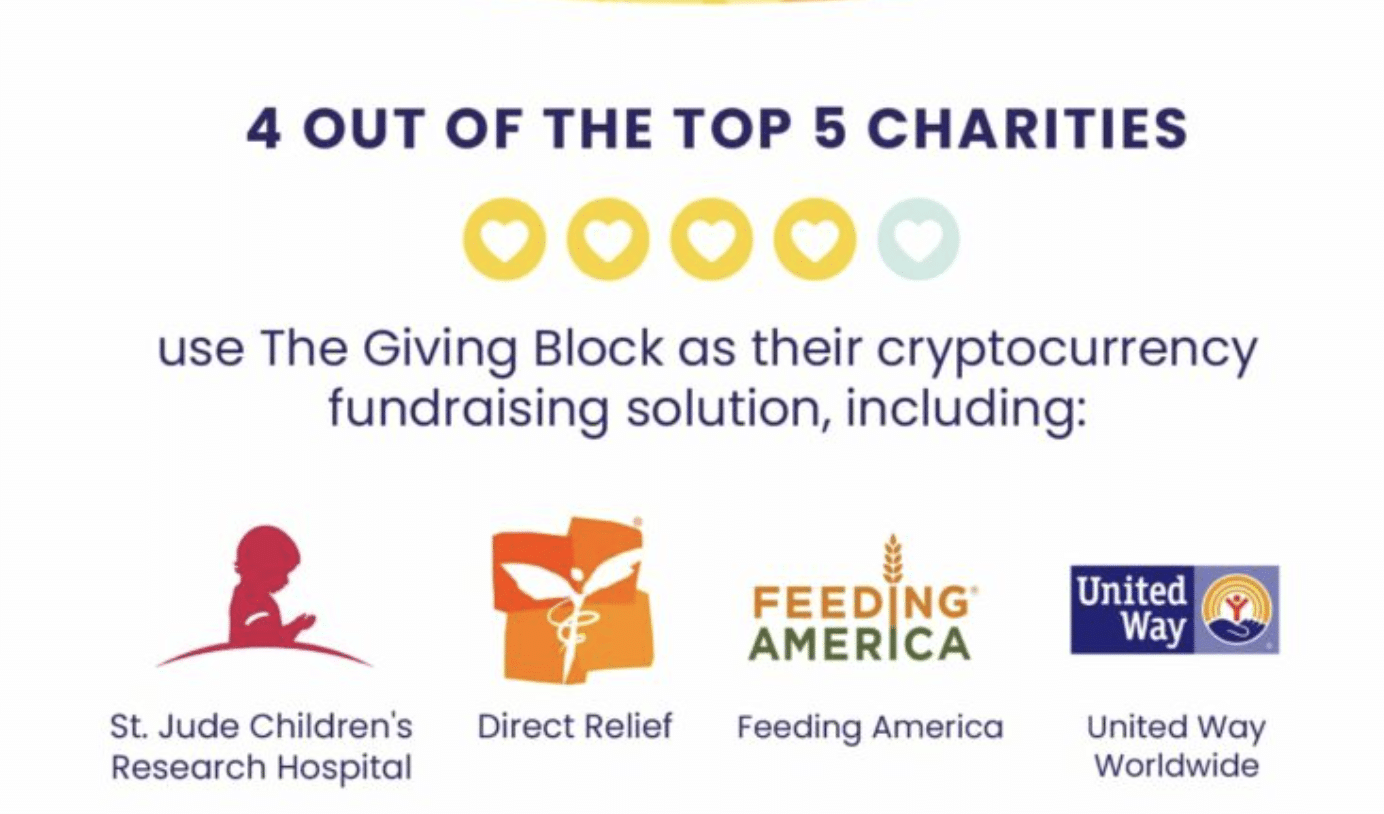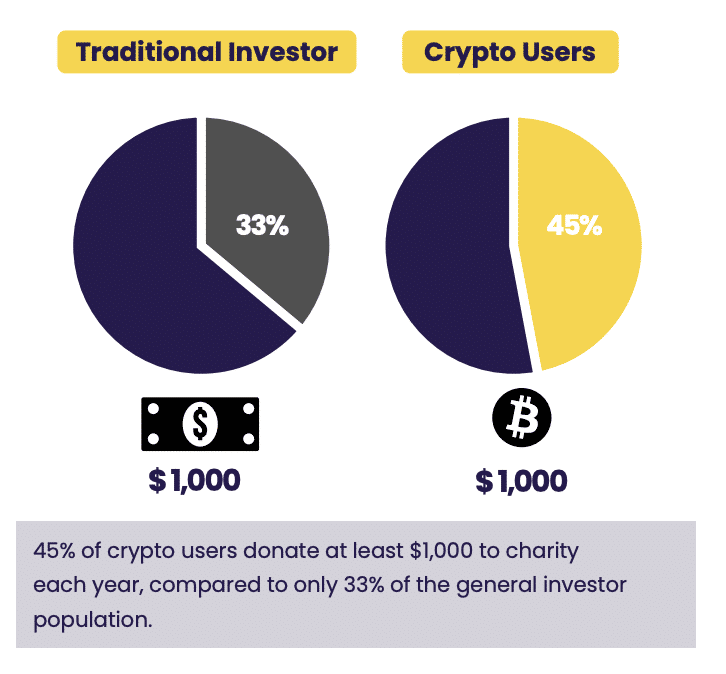The Big List: Charities Embracing Change with Bitcoin and Cryptocurrency Donations

Charitable giving occurs year round, yet end of year donations especially tend to resonate with donors. Recent statistics from digital marketing agency Nonprofits Source found that 30 percent of annual giving occurs in December. Findings further show that 10 percent of annual giving occurs during the last three days of the year.
Therefore, it shouldn’t come as a surprise that crypto holders may be looking to donate cryptocurrency as the year comes to a close. Crypto donations could even reach new highs in 2023 due to recent price increases seen in Bitcoin (BTC), Ethereum (ETH) and other well performing digital assets.
A growing trend: Charities accepting crypto donations
While crypto donations may not yet be as common as traditional giving methods, it’s notable that a number of charities have started to accept cryptocurrency. Zoe Nawar, head of Web3 partnerships at The Giving Block – a crypto and non-cash asset fundraising platform – told Cryptonews that thousands of charitable organizations currently support cryptocurrency. She said:
“These include local food banks, along with some of the largest nonprofits in the world like St. Jude Children’s Research Hospital, Feeding America and United Way Worldwide. And despite some of the misconceptions about the cryptocurrency sector’s carbon footprint, more and more environmental organizations have embraced crypto philanthropy and are seeing positive outcomes from individual donors and charitable NFT projects.”

According to Nawar, The Giving Block currently supports 1,788 nonprofit organizations worldwide, allowing crypto donors to easily donate cryptocurrency online. This is important to note, as Nonprofits Source further found that 51 percent of high-wealth donors prefer to give online. Although this pertains to traditional donation methods, Nawar explained that donating crypto is just as easy as common models.
“Crypto users will have a crypto wallet with an asset they wish to donate. They can find thousands of nonprofits to support on The Giving Block’s website. Each organization has a donation form where users can generate a wallet address, give directly to the organization, and receive a receipt for tax purposes,” she said.
Organizations that accept cryptocurrency donations are also becoming more familiar with the process. For instance, Kelsey Driscoll, senior innovation and partnerships manager at Upbring – a direct-action organization headquartered in Austin, Texas – told Cryptonews that Upbring facilitates crypto donations in a few ways. She said:
“We provide donors with a few options on our website. For example, Upbring has its ‘Crypto Endowment Fund for Better Childhoods,’ where we hold our cryptocurrency donations and invest over time in innovative solutions. The other fund we offer is for direct services, where crypto funds are immediately converted to US Dollars and distributed to programs we support. This gives donors options for giving based on their value systems.”
In order to ensure ease and efficiency, Driscoll explained that Upbring actively engages with financial service providers working to shape the crypto giving space. “We have The Giving Block widgets embedded on our website. We are also listed on Endaoment, which is another crypto-friendly donation platform,” she said. These integrations allow donors to easily send cryptocurrency directly from their crypto wallets to Upbring’s receiving wallet.

Benefits of donating and receiving cryptocurrency for charity
Driscoll added that donors who provide Upbring with their contact information will receive an emailed receipt for a tax deduction. This is important to highlight, as donating cryptocurrency is known to be a more tax-efficient form of giving in comparison to traditional methods.

Nawar elaborated on this, noting that like stock donations, appreciated crypto that is donated directly to a charity is not subject to capital gains taxes. She said:
“By making a crypto donation, you can reduce your tax burden significantly. In turn, that means you’ll be able to donate more to the organization of your choice. So it’s a win-win for both parties.”
In addition to tax benefits, crypto donations are bringing forth a new, younger generation of donors. A report focused on crypto donors from The Giving Block found that 83 percent of Millennial millionaires own cryptocurrency. Another study from Fidelity found that 45 percent of cryptocurrency users are likely to give at least $1,000 per year to charitable causes. In comparison, 33 percent of the general investor population reported giving $1,000 or more to charity per year. Given this, it’s beneficial for charities to accept crypto donations as a way to attract new donors that are eager to contribute.

It’s also worth mentioning that crypto donations are borderless, making transactions easy and transparent. According to Driscoll, this has been a major benefit for Upbring. She said:
“Traditional banking does not meet everyone’s needs equally, especially when it comes to cross-border transactions. Cryptocurrency, and its innate value of decentralization, allows resources to flow more freely between communities. For example, if someone wants to support Upbring but lives outside of the United States, they can send cryptocurrency directly instead of having to incur the costs of converting their currency to US Dollars.”
Charities that accept cryptocurrency
Given the benefits associated with crypto donations, it shouldn’t come as a surprise that thousands of organizations within various industries now support crypto philanthropy.
Global Charities
In fact, some globally recognized organizations have begun supporting philanthropy with digital currencies. For example, UNICEF – also known as the United Nations International Children’s Emergency Fund – launched a crypto fund in 2019 consisting of Bitcoin and Ether. According to UNICEF’s blog post, crypto donations are being used to help support technology startups located in different countries. The post further notes that UNICEF chose to accept cryptocurrency donations due to the transparent nature of blockchain technology. The post states:
“By sharing the public records of crypto transfers, the CryptoFund aspires to create visibility for the donor and the public, adding a layer of transparent accounting to the donation and investment processes.”
In addition to UNICEF, crypto donors can send funds to Save The Children to help kids stay safe, educated and healthy during times of crisis. According to Save The Children’s website, the organization was the first INGO (international Non-Governmental Organization) to accept a Bitcoin donation in 2013 in response to Typhoon Haiyan.
Healthcare Organizations
Susan G. Komen – a leading breast cancer research foundation – also started accepting cryptocurrency donations about two years ago. According to Susan G. Komen’s website, crypto donations allow the organization to save lives, while helping find a cure for breast cancer through research.
My avatar is still wearing the wearable NFT I receive for donating to @SusanGKomen breast cancer foundation in @UplandMe pic.twitter.com/l9euZ5g9v4
— Danny Brown Wolf (@Dannyhbrown) December 29, 2023
The Pediatric Cancer Research Foundation also accepts crypto donations, which is powered by The Giving Block. Moreover, Variety is a children’s charity that is using crypto donations to help kids living with disabilities.
🌟Today is #CryptoGivingTuesday! Your crypto donation can make a difference! Help us reach our goal to provide toys for 5,000 kids experiencing disadvantage this Christmas! All donations DOUBLED today only at https://t.co/ESEWZ6vHto 🎉 @thegivingblock @GivingTuesday pic.twitter.com/CuRE0bnZcm
— Variety – the Children's Charity ❤️ (@varietyvic) November 28, 2023
Environmental Causes
The Giving Block’s Maui Emergency Response Fund has also been collecting crypto donations to help support Maui wildfire victims that were impacted in August 2023. Nawar shared that since then donations to the emergency relief fund for Maui have supported numerous nonprofits. “Thanks to a generous donation match, we’ve raised over $890,000 to date. Now we’re only $50,000 in donations away from reaching the $1,000,000 milestone,” she said.
Red Cloud Renewable – an organization helping thousands of Native Americans move away from fossil fuels towards renewable energy – also accepts crypto donations. The organization’s website includes a link to The Giving Block for donors interested in supporting their cause.
Educational Impact
In addition, Big Brothers Big Sisters of Metro Atlanta has started accepting crypto donations to help educate and mentor Atlanta’s youth.
For those interested in helping kick off space exploration, Space for Humanity accepts crypto donations as a way to support the planet’s first “Sponsored Citizen Astronaut Mission.”
Empowering change through crypto philanthropy
While thousands of nonprofits and organizations currently accept cryptocurrency, crypto donations are likely to become even more common moving forward. According to Nawar, The Giving Block is anticipating a big surge in crypto philanthropy due to the newly expected bull run. “And as crypto gets more mainstream, more nonprofits are going to embrace crypto donors,” she added.
Yet in order to ensure mainstream adoption, more education and awareness is needed. “Education is often a hurdle for charities when it comes to crypto, so The Giving Block prioritizes developing helpful resources for fundraisers and making the donation form and processing as simple as possible,” Nawar pointed out.
Indeed, The Giving Block offers a number of blog posts, reports and guides for those interested in learning more about crypto philanthropy. Private donors and institutions seeking further information on crypto giving can also learn more about getting involved through The Giving Block.
Although a learning curve may be involved, Driscoll noted that incorporating crypto donations can help charities grow in a number of ways. For example, she explained that Upbring was able to launch its “Crypto Endowment Fund” by participating in an NFT fundraising project called “Awaken Your Inner Child.” “All mint proceeds went to Upbring directly through a smart contract. The project consisted of 541 pieces and sold out in 30 minutes, generating over $10,000 which helped launch our fund,” she said.
As 2023 comes to an end, now may be the perfect time for crypto holders to donate to crypto-friendly charities. At the same time, nonprofit organizations looking to expand their reach and impact should also consider supporting crypto donations in the coming year and beyond.




